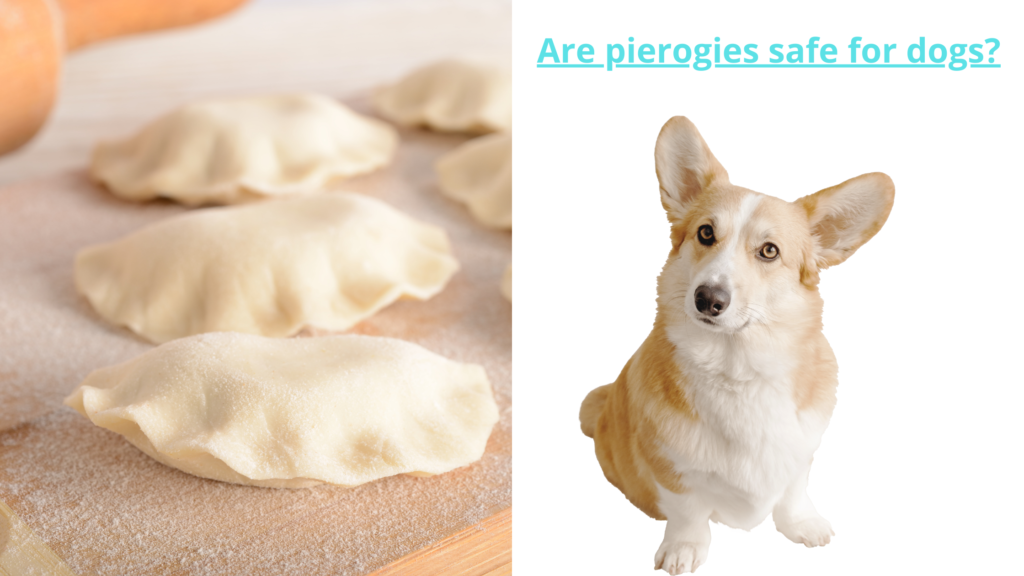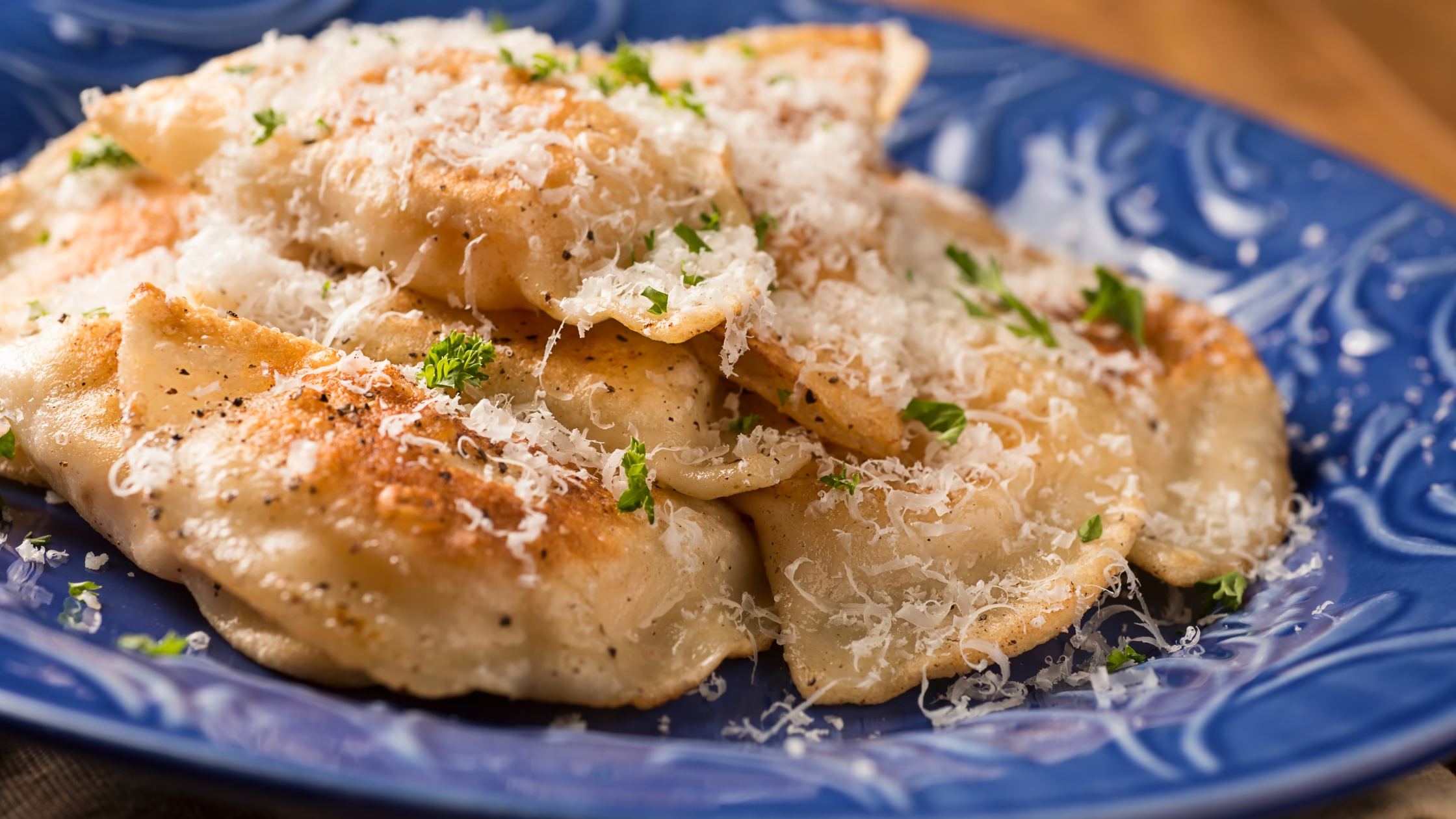Can Dogs Eat Pierogies? Are you a dog owner who enjoys delicious pierogies and wonders if your furry friend can join the culinary experience?
Many pet owners have questioned whether sharing this savory treat with their canine companions is safe.
In this article, we will delve into the world of pierogies and explore whether dogs can also safely enjoy them.
We’ll uncover the truth behind this popular question and provide you with valuable insights to make informed decisions about feeding pierogies to your four-legged friend.
So, let’s satisfy your curiosity and find out if dogs can indulge in the delight of pierogies!
Understanding Pierogies
Pierogies are delightful Central and Eastern European dumplings that have gained popularity worldwide.
These delicious treats are made from unleavened dough filled with various ingredients such as mashed potatoes, cheese, onions, meat, or vegetables.
Pierogies are often boiled or fried until golden brown, resulting in a deliciously crispy exterior and a soft, flavorful filling.
It’s no wonder that pierogies have become a favorite among food enthusiasts, but the question remains: can dogs partake in the joy of these delectable dumplings?
This curiosity stems from our deep bond with our furry friends and our desire to include them in our culinary adventures.
So, let’s dig deeper into whether pierogies are a safe and suitable treat for our beloved canine companions.
Also Read: Can Dogs Eat Nopales? Discover the Benefits and Tasty Recipes!
Can Dogs Eat Pierogies? Are pierogies safe for dogs?

While we may find pierogies to be a mouthwatering delight, it’s essential to consider the potential risks when sharing this treat with our furry friends.
Pierogies, especially those prepared for human consumption, often contain ingredients that can be problematic for dogs.
One of the primary concerns is the high-fat content found in many pierogies.
Dogs have different dietary requirements than humans, and excess fat can lead to digestive issues, pancreatitis, and weight gain.
Additionally, the seasonings and fillings in pierogies may include ingredients that are toxic to dogs, such as onions or garlic.
These can cause damage to their red blood cells and lead to anemia.
We must prioritize our dogs’ well-being by being cautious about the foods we share with them.
While a small nibble or accidental ingestion may not cause immediate harm, it’s best to err on the side of caution and avoid intentionally feeding pierogies to our furry companions.
There are plenty of other dog-friendly treats available that are both safe and enjoyable for them.
Responsible pet owners must provide a balanced and nutritionally appropriate diet for their dogs.
So, let’s explore some alternative treats and meals that can satisfy our dogs’ cravings without compromising their health.
Nutritional Value and Benefits of Pierogies
While pierogies may be tasty for humans, it’s important to understand that their nutritional value may not align with the dietary requirements of our canine companions.
Pierogies are typically made with flour, potatoes, cheese, and various fillings, offering a blend of carbohydrates, fats, and proteins.
However, dogs have unique nutritional needs that may not be adequately met by consuming pierogies.
A balanced diet specifically formulated for dogs is crucial to ensure they receive the necessary nutrients for optimal health and well-being.
This includes a proper balance of proteins, fats, carbohydrates, vitamins, and minerals.
While pierogies may offer some macronutrients, they may lack the essential micronutrients and specific ratios needed to support a dog’s overall health.
Feeding pierogies to dogs regularly or as a significant part of their diet can lead to imbalances and potential deficiencies in vital nutrients.
Moreover, the high-fat content and potential presence of harmful seasonings or ingredients to dogs make pierogies an unsuitable choice for their dietary needs.
To provide our furry friends with the nutrition they require, it’s best to stick to a well-balanced, commercially available dog food that meets the standards set by veterinary professionals.
These specialized diets are carefully formulated to address the specific needs of dogs, ensuring they receive the proper balance of nutrients to support their growth, energy levels, and overall health.
Remember, it’s always best to consult with a veterinarian regarding your dog’s dietary needs and any specific concerns before introducing new foods.
By prioritizing their nutrition, we can help ensure our dogs live long, healthy, and happy lives.
Also Read: Are Dogs Stronger Than Humans? Debunking the Myth and Uncovering the Truth
Potential Risks and Allergies – Feeding pierogies to dogs
Feeding pierogies to dogs can come with various risks and potential complications that every responsible dog owner should be aware of.
One major concern is the impact on a dog’s digestive system. Pierogies are often rich in fat and can be heavy on the stomach, leading to digestive issues such as upset stomach, diarrhea, or vomiting.
The high-fat content can also put dogs at risk of developing pancreatitis, a painful pancreas inflammation.
Additionally, certain ingredients commonly found in pierogies, such as onions or garlic, can be toxic to dogs.
These ingredients can cause damage to a dog’s red blood cells and lead to a condition called hemolytic anemia. Other seasonings or spices used in pierogies may also risk dogs’ health.
Moreover, some dogs may have specific food allergies or sensitivities that can be triggered by ingredients present in pierogies.
Wheat or gluten, for example, are common allergens in dogs and can cause skin irritations, gastrointestinal upset, or other allergic reactions.
To ensure the well-being of your furry friend, it’s crucial to consult with a veterinarian before introducing any new food into their diet, including pierogies.
A veterinarian can provide personalized guidance based on your dog’s needs, allergies, and health conditions.
They can advise on safe and appropriate alternatives that meet your dog’s nutritional requirements without compromising their health.
Remember, our dogs rely on us to make informed decisions about their diet and overall well-being.
By prioritizing their safety and seeking professional advice, we can help prevent potential risks or complications and keep our four-legged friends healthy and happy.
Also Read: Can Dogs Eat Oatmeal Cream Pies? Exploring the Safety and Risks
Alternatives and Safe Treat Options
If you’re looking for safe and healthy treats for your canine companion, there are plenty of alternatives to pierogies that dogs can enjoy.
You can provide your furry friend with tasty and nutritious treats without compromising their health by opting for dog-friendly ingredients.
One option is to explore homemade treats. You can create delicious snacks using dog-friendly ingredients like lean meats (such as chicken or turkey), vegetables (like carrots or sweet potatoes), and whole grains (such as brown rice or oats).
These ingredients offer a balance of protein, vitamins, and fiber that can contribute to your dog’s overall well-being.
Numerous recipes available online cater specifically to dog treats, allowing you to unleash your inner chef and create treats tailored to your dog’s preferences and dietary needs.
If you prefer ready-made treats, several commercially available options prioritize the health and safety of dogs.
Look for treats specifically formulated for dogs, made with natural and high-quality ingredients, and free from artificial additives or preservatives.
Treats designed to promote dental health, such as chews or treats that help reduce tartar buildup, can also be a beneficial choice.
Remember, moderation is key when it comes to treating your dog.
Even with safe and healthy options, treats should be given in appropriate portions to avoid excessive calorie intake or dietary imbalances.
It’s always a good idea to consult with your veterinarian for guidance on the best treatment options for your dog’s specific needs, considering factors such as age, size, and any existing health conditions.
By exploring alternative treats and safe options, you can provide your furry friend with delicious and nutritious alternatives to pierogies while prioritizing their health and happiness.
Also Read: 4 Best Dog Training Apron Guide: Mastering Dog Training
Conclusion
In conclusion, it’s important to prioritize their health and well-being when it comes to feeding pierogies to dogs.
While pierogies may be a portion of delicious and popular human food, they pose potential risks to dogs due to their high-fat content, seasoning, and ingredients that can harm our furry friends.
Onions, garlic, and other ingredients commonly found in pierogies can be toxic to dogs and may lead to serious health issues.
It’s crucial to consult with a veterinarian before introducing any new food to your dog’s diet.
They can provide expert guidance tailored to your dog’s specific needs and help you make informed decisions regarding their nutrition.
Your veterinarian can recommend safe and appropriate treats or alternatives that offer nutrients without compromising your dog’s health.
Remember, there are numerous alternative treats and safe human foods that dogs can enjoy.
Homemade treats using dog-friendly ingredients or commercially available dog treats are great options.
These alternatives prioritize your dog’s well-being by providing balanced nutrition and minimizing the risk of digestive issues, allergies, or other adverse reactions.
By seeking professional advice and being mindful of the potential risks, you can ensure that your furry friend receives a safe and nutritionally appropriate diet.
Always put your dog’s health first, and enjoy the journey of discovering new treats and alternatives that will keep them happy, healthy, and tail-waggingly satisfied!







